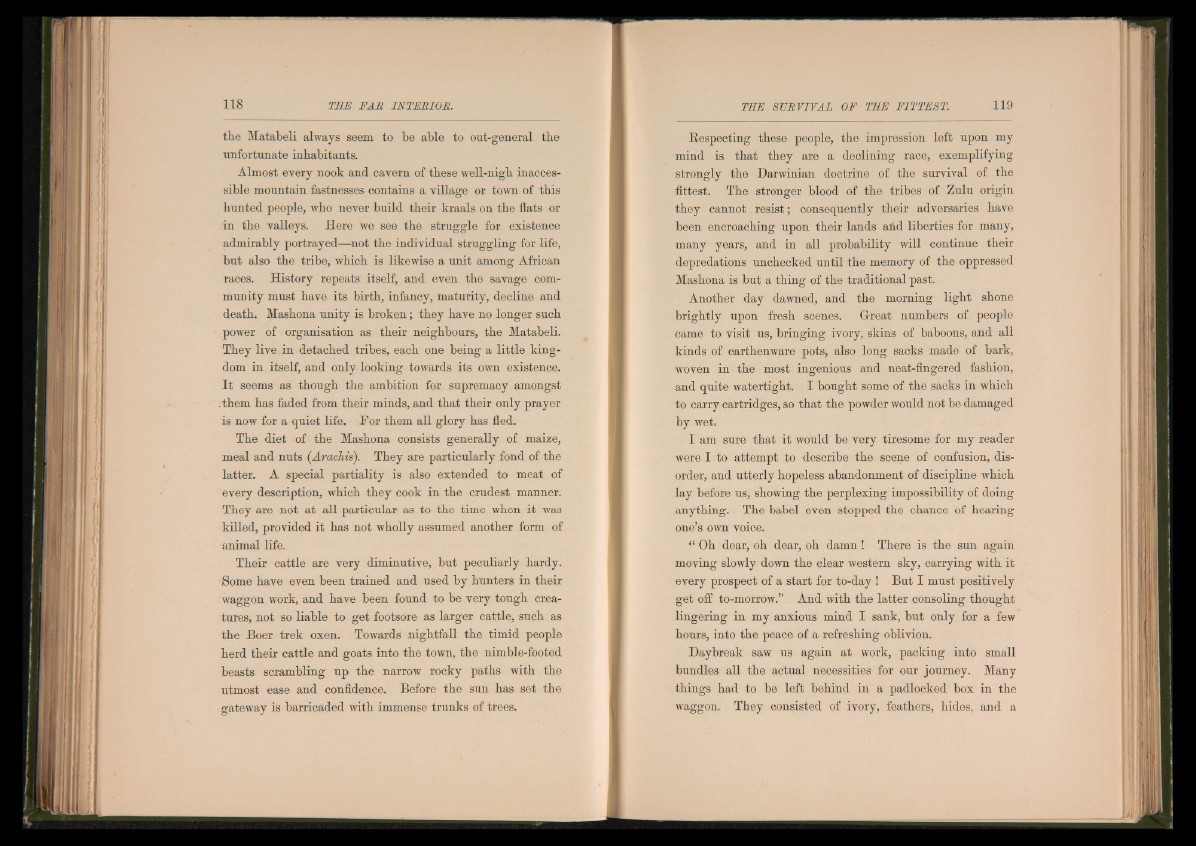
the Matabeli always seem to be able to out-general the
unfortunate inhabitants.
Almost every nook and cavern of these well-nigh inaccessible
mountain fastnesses contains a village or town of this
hunted people, who never build their kraals on the flats or
in the valleys. Here we see the struggle for existence
admirably portrayed—not the individual struggling for life,
but also the tribe, which is likewise a unit among African
races. History repeats itself, and even the savage community
must have its birth, infancy, maturity, decline and
death. Mashona unity is broken ; they have no longer such
power of organisation as their neighbours, the Matabeli.
They live in detached tribes, each one being a little kingdom
in itself, and only looking towards its own existence.
I t seems as though the ambition for supremacy amongst
. them has faded from their minds, and that their only prayer
is now for a quiet life. For them all glory has fled.
The diet of the Mashona consists generally of maize,
meal and nuts (Arachis). They are particularly fond of the
latter. A special partiality is also extended to meat of
every description, which they cook in the crudest manner.
They are not at all particular as to the time when it was
killed, provided it has not wholly assumed another form of
animal life.
Their cattle are very diminutive, but peculiarly hardy.
Some have even been trained and used by hunters in their
waggon work, and have been found to be very tough creatures,
not so liable to get footsore as larger cattle, such as
the Boer trek oxen. Towards nightfall the timid people
herd their cattle and goats into the town, the nimble-footed
beasts scrambling up the narrow rocky paths with the
utmost ease and confidence. Before the sun has set the
gateway is barricaded with immense trunks of trees.
Respecting these people, the impression left upon my
mind is that they are a declining race, exemplifying
strongly the Darwinian doctrine of the survival of the
fittest. The stronger blood of the tribes of Zulu origin
they cannot resist; consequently their adversaries have
been encroaching upon their lands and liberties for many,
many years, and in all probability will continue their
depredations unchecked until the memory of the oppressed
Mashona is but a thing of the traditional past.
Another day dawned, and the morning light shone
brightly upon fresh scenes. Great numbers of people
came to visit us, bringing ivory, skins of baboons, and all
kinds of earthenware pots, also long sacks made of bark,
woven in the most ingenious and neat-fingered fashion,
and quite watertight. I bought some of the sacks in which
to carry cartridges, so that the powder would not be damaged
by wet.
I am sure that it would be very tiresome for my reader
were I to attempt to describe the scene of confusion, disorder,
and utterly hopeless abandonment of discipline which
lay before us, showing the perplexing impossibility of doing
anything. The babel even stopped the chance of hearing
one’s own voice.
“ Oh dear, oh dear, oh damn ! There is the sun again
moving slowly down the clear western sky, carrying with it
every prospect of a start for to-day ! But I must positively
get off to-morrow.” And with the latter consoling thought
lingering in my anxious mind I sank, but only for a few
hours, into the peace of a refreshing oblivion.
Daybreak saw us again at work, packing into small
bundles all the actual necessities for our journey. Many
things had to be left behind in a padlocked box in the
waggon. They consisted of ivory, feathers, hides, and a